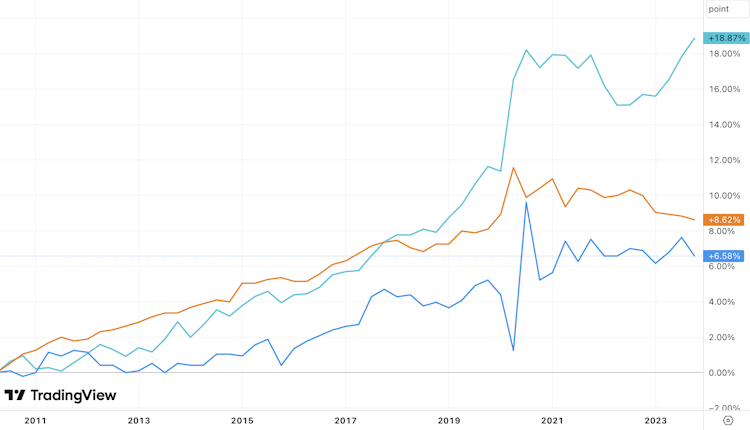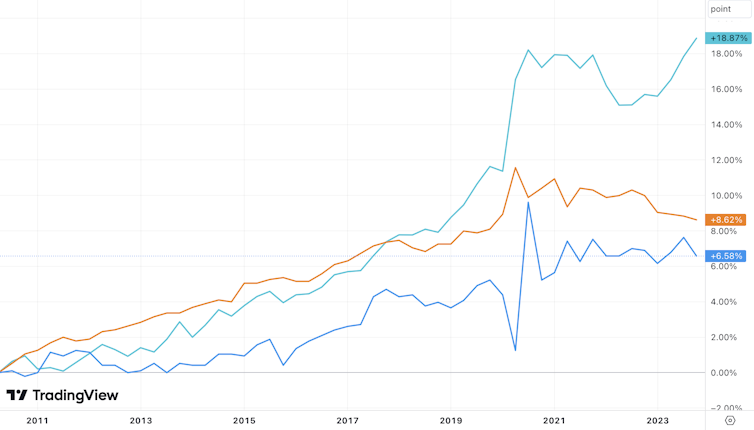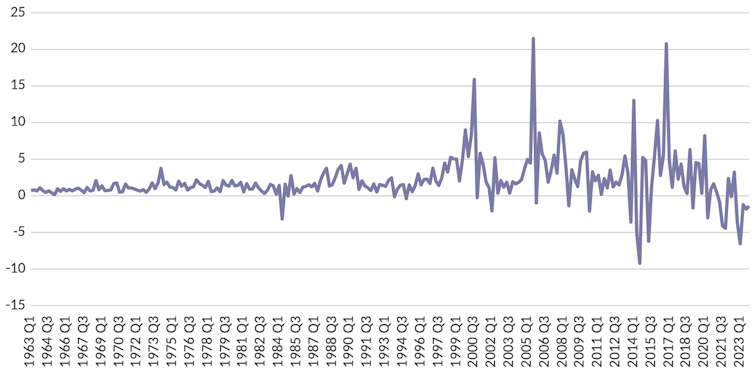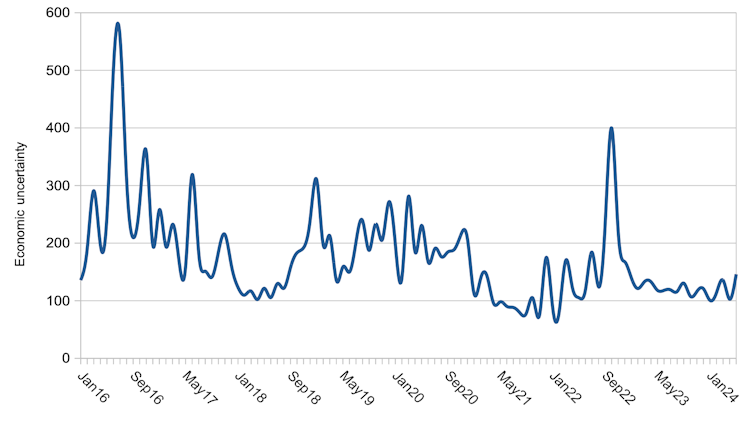For the next prime minister to solve the UK’s productivity problem, they must attract more foreign investment – here’s how

The British economy has a serious productivity problem that will have to be addressed by the next government. According to data from the OECD (the Organisation for Economic Co-operation and Development), productivity measured as GDP per hour worked in the UK only rose 4% between 2015 and 2022. The average increase across all 43 OECD countries over the same period was 7%.
The UK is also in the bottom 30% for productivity among all OECD economies and shows no signs of improving. The latest statistics from the UK’s Office for National Statistics (ONS) suggest that in the first quarter of 2024, GDP per hour worked was only up 0.1% year on year, compared to a historic average of 1.8%. Meanwhile, GDP per worker, the other common measure of labour productivity, was up just 0.8% over the same period, compared to a historic average of 1.4%.
Extremely weak productivity leaves little room for wage increases above the rate of inflation. This hampers the government’s tax revenues, contributing to a persistent gap between spending and income: the budget deficit is currently 4.6% of GDP according to the International Monetary Fund.
Indeed, the next government is potentially facing a £33 billion “hole” in the public finances. This will put upward pressure on borrowing costs, so improving productivity is vital.
The productivity gap (% increase since 2010)
This is not a new problem for the UK; economists have been talking about it for years. It is closely related to business investment, which the National Institute of Economic and Social Research says has declined from close to 14% of GDP in the 1960s and 1970s to 9% since 2008.
Professor David Miles, a member of the Budget Responsibility Committee at the government’s Office for Budget Responsibility and an ex-member of the Bank of England’s Monetary Policy Committee, has cited deindustrialisation. He noted that 30 to 40 years ago, the UK was a bigger manufacturer and less of a services provider, and that productivity growth tends to be stronger in manufacturing.
So how does the UK improve productivity? One way is to attract more foreign investment, which is disproportionately important to the UK economy. According to a 2021 report from the UK Department for International Trade, just 4% of local business premises are foreign owned, but they account for nearly 40% of the nation’s turnover.
Firms set up by foreign companies account for between 12% and 21% of local employment depending on the region, with London highest and south-west England lowest. Yet they tend to be around 50% more productive than other UK firms, investing up to five times more on R&D (research and development). Most likely, these firms have to be more productive to overcome the sunk costs of entering a new market and competing with domestic incumbents.
Greater productivity means that their wages are 5% higher than UK-owned firms. They are also better managed, and more likely to collaborate with other organisations and share knowledge. On average, it takes about four years for this knowledge to “spill over” to domestic firms. For every ten percentage-point increase in foreign presence in a UK industry, it raises the productivity of that industry by 0.5%.
How to improve foreign investment
So what drives foreign investment? This is the subject of recent research, which is yet to be peer reviewed, that two colleagues from the University of Macedonia in Greece, Theodore Panagiotidis and George Papapanagiotou, and I conducted.
Our main findings are as follows:
1. Economic uncertainty
Foreign investment falls when companies are more uncertain about UK economic policy. As a gauge, we used an index on economic policy uncertainty, which measures references to it in the media.
In recent years, for instance, uncertainty has been created by the 2016 Brexit vote, the unfunded tax cuts announced by Prime Minister Liz Truss in 2022, and more generally the fact that there have been six different chancellors of the exchequer in the past eight years.
The chart below shows how foreign investment was affected by the Brexit vote. It shows that investment became more volatile after David Cameron announced the EU referendum in 2013, then all the more so after the vote three years later.
Foreign inflows as a % of GDP
We estimate that between the referendum and the end of 2020, the proportion of GDP from foreign inflows fell by as much as 0.5%. That’s a considerable amount given that inflows have accounted on average for 2.1% of annual GDP since the 1960s.
2. Rising interest rates and sterling appreciation
Foreign investment falls when the pound rises against other leading currencies by more than the rate of inflation, and also when the cost of long-term borrowing goes up (as measured by the interest rates on ten-year government bonds).
A higher long-term interest rate is associated with higher inflation and lower growth, which in turn raises questions about political and economic stability. Meanwhile, a stronger pound makes it more expensive for foreign companies to buy or invest in the UK.
3. Corporation tax
Lower rates of UK corporation tax relative to other countries can potentially strengthen foreign investment. Cutting this tax can therefore mitigate, to some extent, the negative effects of sterling appreciation, interest rate rises or uncertainties around economic policy.
The takeaway
Above all, whoever wins the election needs to reduce the uncertainty around economic policy. A 2023 survey of 56 US companies doing business in the UK indicated that to continue their investments, they want the government to strengthen its political and trade relations with the EU, and ensure that the UK corporation tax remains competitive.
Yet in 2023, the UK government raised the corporation tax rate from 19% to 25%, which is 1.4 percentage points above the OECD average. This will almost certainly depress foreign investment in the years ahead.
To mitigate this effect, one would be looking for other economic policies to be more certain. In May 2024, however, the uncertainty index was 24% higher year on year as a result of Tory infighting and disastrous local election results.
UK economic uncertainty index
Many expect that the July 4 election result will bring political stability to the UK, which will in turn benefit foreign investment and lift productivity. Whether or not this materialises remains to be seen.
This article is republished from The Conversation under a Creative Commons license. Read the original article.


Costas Milas has received in the past funding by the Bank of England to work, as the principal investigator, on the project Liquidity and Output Growth in the UK. Costas Milas has received in the past ESRC funding as the principal organiser of an ESRC Seminar Series on Nonlinearities in Economics and Finance.









